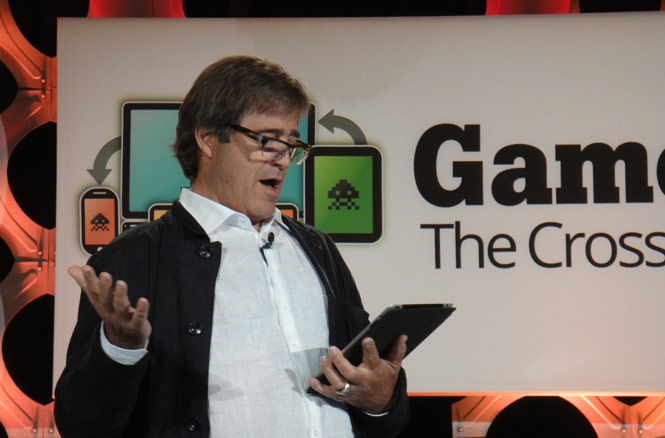Gordon: Neil Young, Zynga. I invested in thatgamecompany pretty quietly about a year and a half ago. I’m doing more gamification stuff. Jason Oberfest started a company called Mango Health, which has gamified prescription drugs. The guy who did Badgeville, Kris Duggan, we invested in Betterworks, aSAS goal-setting company. But no, it’s always awkward, when you’re on the board of a company, to invest in a competitor.
I see many game startups. What’s interesting about this whole generation of mobile winners is that many of them were losers for a long time. That was never the case in console games. In console you never saw somebody fail a long time and then suddenly get successful.
GamesBeat: Yeah, these mobile guys failed for 17 years until they hit.
Gordon: Even Jamdat. There are lessons to learn that are so different from console games, and if you’re already successful you don’t bother to learn those new lessons. I don’t have any broader explanation than that, but the data says Supercell was a failure. Machine Zone did some weird stuff for a while. King was a failure for a long time. Maybe it’s just that everyone failed and so there are few successes, but the failures also failed for a long time.
GamesBeat: Now people are starting to say that you can’t dislodge those guys, that they’re locked in.
Gordon: Yeah, we’ve heard that before. We heard it about FIFA. We heard it about Madden. We heard it about Microsoft Flight Simulator. We heard it about Microsoft’s golf game. We kind of heard it about Ultima. We heard it about the early days of Activision. The new generation of technology always obsoletes stuff.
For some period of time maybe they’ll be hard to dislodge. Online, when there’s a social network effect, it tends to last longer than predicted. I think World of Warcraft has sustained itself for longer than Bobby Kotick probably expected when he first invested in it. Rock Band didn’t last as long.

GamesBeat: Kim Kardashian’s on top now. She brought the old brands back again, brands on top of mobile.
Gordon: We’ve seen that before too. The dislodge thing, having been involved in EA Sports forever — you just know that if you screw up a little bit — watch Sega, which owned the world once. You can do a string of stupid things and next thing you know, you’re wondering where your first-class ticket went to. The stay-thirsty attitude is important. You have to keep inventing. You rest on your laurels, you can get away with it for three months, but not three years.
GamesBeat: What’s your feeling now about the golden age of gaming?
Gordon: We’re still in it. When I said that, I imagined there would be some billion-dollar-a-year online games. We blew right through that. Who would have predicted, 10 years ago, that games would create billionaires? It did it in music and in movies, though. I hadn’t thought about that as a filter before.
In terms of game quality, I don’t have a sense that the Metacritic of popular games now is higher than ever. There’s been a divergence of taste. But boy, you look at some of the console games—Their resolution and storytelling is what we imagined 20 years ago. The size of mobile games is beyond what we imagined 20 years ago. Call of Duty is selling more units per iteration than we imagined 20 years ago.
The audience is broader and more engaged than we thought possible. The hits are bigger than we imagined. But going to market is harder. Maybe it seemed easier to me than many because at Electronic Arts we had so much focus on the retail channel. But at EA we could figure out a formula for going to market that lasted five years at a time. Mobile is still being invented.
By any measure, there are more people making games. You look at something like Minecraft. That was unimaginable even 10 years ago, the scope of success and engagement. Minecraft is like Counter-Strike times 20. So the golden age of gaming is being tinged with platinum.
GamesBeat: What do you think of the opportunities for indie game developers?
Gordon: When I learned about indie movies, it was mostly from reading books. When Miramax took off, all the indie moviemakers wanted to do was get paid as if they were doing features. They wanted to be proudly independent, but make real money. Miramax delivered some of that, or at least got you a little more money and a better shot at Academy Awards.
We don’t really have a Miramax for indie games. None of the channels for indie games have turned out to work very well. The only place where indie games continue to have a clear home is on PC. Google Play and Apple are both pretty hard for stand-alone companies to deal with.
VentureBeat's mission is to be a digital town square for technical decision-makers to gain knowledge about transformative enterprise technology and transact. Learn More


